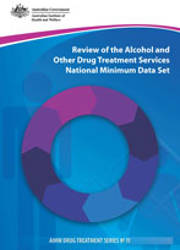Summary
The Review of the Alcohol and Other Drug Treatment Services National Minimum Data Set (AODTS-NMDS) was conducted by the Australian Institute of Health and Welfare (AIHW) at the request of the Intergovernmental Committee on Drugs (IGCD), funded by the Australian Government Department of Health and Ageing (DoHA).
Purpose and process
The purpose of the review was to assess the AODTS-NMDS as an information source for services policy; data gaps; and options for future development within the collection.
The project was undertaken in four parts: a literature review; consultation with stakeholders in the alcohol and other drugs (AOD) sector, including policy makers, researchers and treatment agencies; analysis of the common themes between the literature review and the consultations; and reporting of the findings.
International and domestic context
The literature review identified potential lessons from the international experience, including different kinds of data collections and their development processes. Of particular interest was the United Nations Office on Drugs and Crime work on internationally standardised data collection in the AOD treatment field and the collections of countries with similar treatment models, such as Canada. Domestically, changes to AOD service provision, as a result of potential changes to the national health system, are challenging to anticipate and the implications for health data collection, monitoring and reporting are unknown. There is, however, increasing interest in collecting more information about specific populations considered to be ‘at risk’, such as those people experiencing homelessness and/or mental illness, Aboriginal and Torres Strait Islander peoples, injecting drug users and families.
Common themes
The most common theme of the review was the need for a common understanding of AOD treatment in the context of the AODTS-NMDS, to clarify the purpose, scope and content of the collection and strengthen the governance arrangements through the DoHA and the IGCD. Stakeholders also identified concepts that they would like to see captured in the collection, such as primary caring status, treatment history, mental health status and many other concepts, though there was no consensus on which concepts were most important. The ability to estimate the number of unique individuals was considered important by all stakeholders, however the use of a statistical linkage key was not. Similarly, stakeholders agreed that while capturing more information about clients and agencies would be beneficial for service planning and policy setting, it must be balanced with the administrative burden on agencies and the resources required by states and territories to report these data.
Governance and strategic direction
This review supports the roles of the DoHA and the IGCD to provide strategic direction and guidance for the development of the AODTS-NMDS, including negotiating the relationships between relevant stakeholders. As the AODTS-NMDS was originally designed to assist with the evaluation, monitoring and reporting of the National Drug Strategy (NDS), it is appropriate for the collection to be governed by the same bodies that implement the strategy. As the IGCD has representation from all states and territories, it is also an appropriate body
to discuss and negotiate issues that may arise within jurisdictions that impact on the collection, including the role of treatment agencies, sector peak bodies and research centres and to manage these relationships.
Scope
To better meet policy needs and accurately reflect contemporary practice, the scope of the AODTS-NMDS may need to change. Common scope issues that were raised by stakeholders include the paucity of data on treatment in correctional facilities, clients on opioid pharmacotherapy and AOD services provided in non-specialist settings, such as crisis accommodation and sobering-up shelters. This review recommends that the IGCD and the DoHA determine the appropriate scope for the collection in line with the pending NDS.
Other concepts
All stakeholders expressed interest in collecting more information than is currently captured by the AODTS-NMDS. The concepts raised can be broadly categorised into information about clients, the treatment being provided and the treatment agency. Examples of client-level information include their housing status, mental health status and caring responsibilities (if they have children). Examples of treatment-level information were treatment intensity, activities and an outcome measure; and agency-level information such as capacity to deliver, funding source or treatment philosophy. There are various appropriate methods for capturing these concepts, including introducing new data elements and/or implementing data linkage.
Analysis of current elements
In addition to longer term planning and decision making, this review has identified many tasks that may be undertaken immediately, at the direction of the DoHA and the IGCD. Enhancements could be made to current data elements and/or implementation of existing data elements from the National Health Data Dictionary or the Community Services Data Dictionary, to improve the comprehensiveness, consistency and quality of the collection.
How to change the collection
All changes to national minimum data sets, whether intended for voluntary or compulsory collection by jurisdictions, require endorsement by the National Health Information Standards and Statistics Committee, a subcommittee of the Australian Health Ministers’ Advisory Council.
Products and processes
Stakeholders were generally supportive of the products emanating from the collection. The online data cubes were used by treatment agencies and researchers while all stakeholders appreciated the availability of the printed annual report and state and territory bulletins. Suggestions were made to improve the profile of the collection, including producing inserts for conferences and advertising the data request process to a wider variety of users.
Privacy and consent
Pending the release of draft legislation regarding the harmonisation of Australian privacy arrangements, as a result of the Australian Law Reform Commission review, privacy and consent processes should be reviewed by each state and territory to ensure compliance with current relevant legislation.
Conclusion
This review provided an opportunity to examine not only the operation of the collection within the AOD sector, but also to consider the wider operation, program and policy context of AOD treatment. It has highlighted the importance of a comprehensive, robust and consistent data collection about AOD treatment and that the AODTS-NMDS remains a key component of the data toolbox available to inform government, service provision and the public on AOD issues in Australia.



